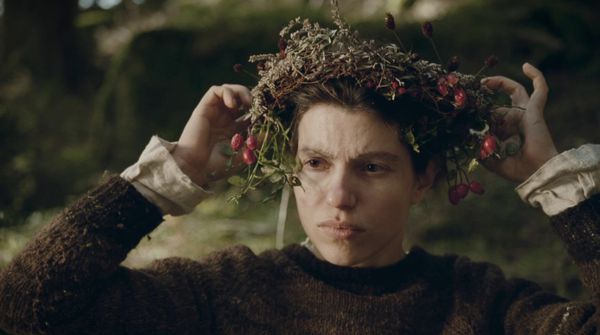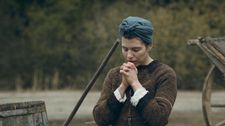Based on historical records from mid-18th century Upper Austria, Veronika Franz and Severin Fiala’s The Devil’s Bath (Des Teufels Bad, a highlight of the 23rd edition of the Tribeca Festival and Austria's Oscar Submission) drops us into a rural society with strict codes governing the here and the hereafter. A baby cries, as its older brother conducts a shadow play on the laundry hung out to dry in the sun. He is called back into the house by an adult male voice, while the mother picks up the infant and walks with it through the forest up to a waterfall.
Shot by Martin Gschlacht (Silver Bear winner in the 2024 Berlin Film Festival) with costumes by Tanja Hausner (Jessica Hausner’s sister and longtime collaborator) and starring Anja Plaschg (who is also the composer as Soap&Skin) with Maria Hofstätter and David Scheid, is executive produced by Ulrich Seidl (Rimini and Sparta) and Bettina Brokemper (Margarethe von Trotta’s Ingeborg Bachmann - Journey Into the Desert, starring Vicky Krieps and Ronald Zehrfeld).
Agnes (Anja Plaschg), wearing a thick brown woolen sweater, braids a fragile wreath for her hair and wraps her precious collection of dried grasses, insects and shells into a kerchief. This is her wedding day and together with her mother, brother, and a chicken, they are off through the woods to celebrate. Wolf (David Scheid), the groom, drinks and laughs with his male friends until it is time to lead Agnes to their new abode, a gloomy old stone hut, dark and uninviting, and so costly that it ate up everything they had, including the dowry.
A chopped-off finger or toe from an executed woman increases fertility. Cooking and recipes are timed by the length of prayers - three more pater nosters and the soup is done! The rules of the land and the superstitions of the day unfold at a steady pace, as Martin Gschlacht’s glorious and smart cinematography adds clarity here while sprinkling doubt over there.
Tanja Hausner’s costumes speak of the historical past, and allow glimpses into the future, as when the protagonist, after an uneventful wedding night, looks for her husband while wearing the aforementioned sweater over a nightgown, making her look utterly modern.
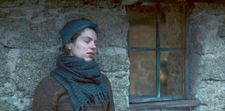 |
| Veronika Franz on Anja Plaschg: “She read the script and came back to us with emotions and thoughts and we were blown away …” |
A carp bone makes for a fine hair ornament, dishes are washed in a puddle outside, and blood in the brook tells others that a child is not on its way. Finding an animal scull in the water is bad luck and Agnes takes it all in, scratching her tongue until it bleeds. “Not being a local girl” makes her “a cross to bear,” they say. The barber, who fulfills the functions of doctor and medicine man, has remedies to drain the evil out, with the help of two holes in the nape of the neck and a small bundle of hair that is to be pulled back and forth to bring about infection. Leeches and rat poison and monarch butterflies escaping from the mouth, underlined by a festering sound design - The Devil’s Bath takes its frightfully factual shape.
The horror in Veronika Franz and Severin Fiala’s third feature together (following Goodnight Mommy and The Lodge) is very much of this world and rooted in a belief system that brought hundreds of women “weary of this life” to commit acts of murder and confess, so as to be forgiven and spared eternal condemnation. By exploring the absurdity of constructions of belief in the past, we are invited to inspect those of the present.
From New York, during the Tribeca Festival, Veronika Franz and Severin Fiala joined me on Zoom for an in-depth conversation on The Devil’s Bath.
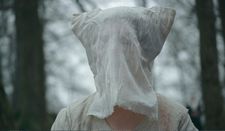 |
| Severin Fiala on Anja Plaschg as Agnes: “I think she personally wanted to disappear behind this character.” |
Anne-Katrin Titze: Anja Plaschg not only gave this woman so much depth, she also did the music! Let’s talk about the costumes - Tanja Hausner, from her sister Jessica Hausner’s films to Frauke Finsterwalder’s Sisi & I, she is incredibly versatile and managed something remarkable with the wardrobe in your film. There is a moment when the protagonist is wearing a nightgown and over it the thick brown woolen sweater. This could be yesterday!
Veronika Franz: That’s what we wanted to achieve exactly!
Severin Fiala: That was the concept! We don’t want this to feel like a period film in the sense that everything has to be historically accurate or beautiful like in a painting. We wanted everything to feel natural, timeless in a way. Maybe not historically accurate, but plausible. It should feel normal in a way and that’s what Tanja beautifully did.
VF: Accurate when it comes to materials, forms, and colours. But we also borrowed boots from the second-hand military store because it fit the worn leather and it looks just fine. Another thing with the concept was that the costumes had to have mistakes because they would not have clothes made for them. They would maybe inherit the dress from their grandmother and the breast part would be too big, or there’d be holes in it. So we told her, every costume had to have mistakes.
AKT: Did Anja do the music beforehand or after the film was done?
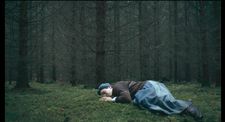 |
| Veronika Franz on Anja Plaschg as Agnes: “For this movie she went back to her family because she also has this farmers background.” |
VF: In the end.
SF: She did it afterwards, but as she also was acting, it was, I think, a back-and-forth, but only in her head. She shared and composed it only after the film was done, but I think she knew at some moments how the music would feel and she adjusted her performance to that.
VF: As you might have read, we approached her in the beginning only for the music because we wanted her to compose the score and asked her if she would read the script. She read the script and came back to us with emotions and thoughts and we were blown away because she seemed to be able to relate to the story very well. Then we asked her to audition because she had not played such a big part before.
It was only the three of us and instantly we could see her charisma and also her openness and willingness to put herself up to whatever a scene requires. It was very impressive. She wants to give everything she has for the scene. Whatever it is. If she had to throw up, she wants to make it real or as good as she can, or running into a field of corn. Whatever it is, she really wants to experience something.
SF: What she and we felt was that it is about a woman who had lived. Her life story we read and found touching. We wanted to do justice to her and Anja felt the same, so she really took it very very seriously. It was not like an acting job or something and to have a premiere on the red carpet or something like that. She really was always thinking about doing it right and giving it her everything. I think she personally wanted to disappear behind this character.
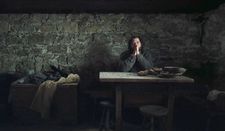 |
| Wolf (David Scheid), Agnes’s husband |
VF: For this movie she went back to her family because she also has this farmers background. She grew up on a pig farm and she talked to her grandmother about their circumstances, about how she lived. She kept saying that she confronted herself with her own roots too, women’s stories of her own family.
AKT: Giving back to the past! In a very interesting way, the film is not only giving something to future generations who will watch it, but also to those long gone in the past!
VF: Yes, true!
AKT: I have to talk about Martin Gschlacht in this context because his cinematography is so remarkable and there are images that will stick in our minds. The goat upside-down in a Christ-like composition or even the fishbone that becomes a hair ornament. The way he frames history!
SF: We also have done Goodnight Mommy with Martin. He’s such a professional cinematographer and we were sort of afraid because it was our first film that probably he was not going to listen to us or be interested in the story and just do it as a professional job. And it was like the opposite was true! We never experienced a cinematographer who could really understand the story that well and who really wanted to fulfill the needs the story had and that we had. So it was a very good cooperation.
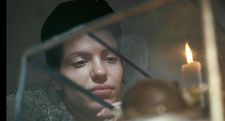 |
| Severin Fiala on cinematographer Martin Gschlacht: “I think he’s best when you confront him with nearly impossible challenges.” |
And with this film we had the impression that Martin - I mean he’s always an amazing cinematographer - but I think he’s best when you confront him with nearly impossible challenges. For this film it was that we wanted to shoot it on film, 35mm film stock, and we didn’t want to use as far as possible any artificial lights. For example the house, the main location, when we first looked at it and we all went in, everybody took their cellphone out and turned the lamps on.
Even in daylight it was too dark for your own eyes and he shot a film there! I mean, the light meter said error from the first day to the last because it was just too dark to shoot. He trusted the film stock and we trusted him. He was very daring and very courageous and this makes it very special in how the film looks.
Read what Veronika Franz and Severin Fiala had to say on the joy of research, shadow play, “suicide by proxy,” superstitions and medical history in the 18th century, fairy tales and Maria Hofstätter as the mother-in-law.








